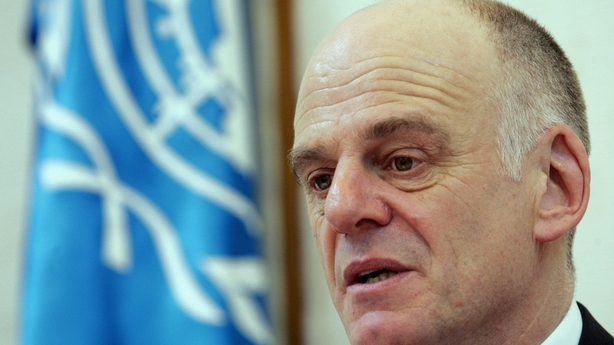Dr David Nabarro, Covid Special Envoy for the World Health Organization, has said they do not see a serious variant of Omicron on the horizon.
Dr Nabarro said that while a lot of new variants are appearing around the world, they are not labelling any of them as one of concern.
Speaking to RTÉ's Morning Ireland, he said they are continuing to look at "all manifestations of this virus".
"What tends to happen as these kinds of infectious disease infections advance you get the more transmissible variants becoming dominant," he added.
Dr Nabarro said that quite often the more transmissible ones are not as severe in terms of the illness they cause.
He said the WHO offers guidance on the way data is obtained from communities, but countries decide for themselves how they are going to make the definitions.
There have been "intensive discussions" between public health specialists in China and the WHO regarding Covid-19 to get an understanding of what is happening, he said, and they have been "very fruitful".

Dr Nabarro said he is confident the information from China on Covid is "certainly the best data we can get".
However, he acknowledged that there is always a challenge when it comes to accuracy because the virus moves quickly and the figures produced are sometimes old.
He said that is improving all over the world because everyone has woken up to the realisation of a series of new surges appearing.
Dr Nabarro said there are some "promising signs" about the effectiveness of available vaccines but warned no protection is 100%.
The one challenging feature of this virus, he added, is that it is capable of changing and evading some aspects of vaccine protection.
Earlier this week, Professor Kingston Mills of Trinity College Dublin said a new, highly transmissible coronavirus variant known as 'Kraken' is likely to become the dominant strain in Ireland.
Prof Mills said the main concern is that it is quite different to Omicron, and those who have been infected with Omicron are less likely to be protected through immunity.
Fewer than five cases of the 'Kraken' Covid strain have so far been detected in Ireland.
Read more:
What do we know so far about the 'kraken' Covid variant?
China to see rural Covid-19 surge over Lunar New Year
Latest coronavirus stories
The Interim CEO of the Health Service Executive has said the uptake of Covid vaccinations in Ireland, compares really well internationally.
Speaking on RTÉ's Morning Ireland, Stephen Mulvany said the 18 to 49 age group booster vaccine got the go ahead from the National Immunisation Advisory Committee just before Christmas and started on 29 December.
He said there is a population of 1.49 million that can avail of the booster in the latest rollout but "the percentage uptake at this point is low". However, the levels of vaccination in the overall population are high.
"Our main concern with co-vaccination is the level in our healthcare workers, which is low, albeit there are data issues in that because we have vaccinated 70,000 healthcare workers. But that's using what we call the Covax system data, which is based on over 240,000 registered healthcare workers."
He said the HSE is still encouraging health workers and the general public to get vaccinated against Covid.
"We're making every opportunity available to staff to get them vaccinated."
We need your consent to load this rte-player contentWe use rte-player to manage extra content that can set cookies on your device and collect data about your activity. Please review their details and accept them to load the content.Manage Preferences
Meanwhile, the Minister for Finance has said getting through a winter without a crisis in public hospitals caused by overcrowding remains a priority for the Government.
Michael McGrath was speaking as figures from the Irish Nurses and Midwives Organisation showed there were 438 patients waiting for a hospital bed this morning.
Minister McGrath said the Government needed to invest more than what had already been committed to the public healthcare system in order to address long-term capacity issues and end overcrowding.
"We need to go further. It does mean adding further capacity to the system and that is what we will do as a priority," he said.
The minister said almost 1,000 acute hospital beds and around 340 community beds had been added since the Government came into office two-and-a-half years ago, but he acknowledged that the population was increasing and ageing and that too was presenting challenges.

